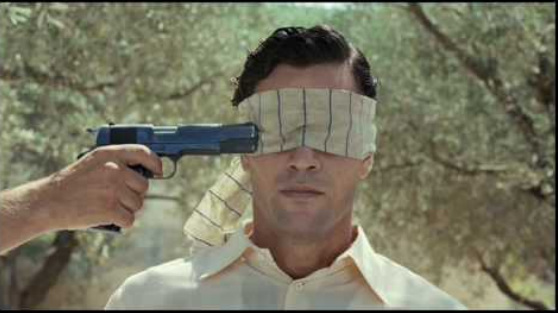The Time That Remains

Jan 7, 2011 - 'The Time That Remains' starts with Menashe(Menashe Noy) picking up a passenger in his cab from the airport in Tel Aviv. Soon, an intense storm strands them, leaving the cab driver in a place that he does not recognize which is to be expected in a country where so many of the old towns simply do not. The Time That Remains: Chronicle of a Present Absentee is a must-see by writer-director-co-star Elia Suleiman. Review: Coping with the irreversible, the cultural aftermath of the creation of Israel - The Time That Remains starts in 1948 in Palestine with the invasion.
The Time That Remains begins with a cab passenger in dark silhouette, blurred in the backseat. The driver’s doing all the talking.
“You’re not allowed to smoke, but you can if you want,” he says, then, “Where am I?” The driver, an Israeli, feels out of place in a land he doesn’t recognize; his passenger, a Palestinian present absentee, feels even more so. You wouldn’t know by listening to him, though, because the man never speaks. One of the many simple conceits of Elia Suleiman’s film is the way in which one man’s silence becomes a metaphor for an entire nation’s. The character shares the director’s name, and is played by him, as has been the case in Suleiman’s two previous features, Chronicle of a Disappearance and. Like both of these films, The Time That Remains frequently unfolds in deadpan comedy tableaux, Arabs and Israelis roaring at each other in long shot inside a fixed, unmoving frame.
As in both these films, the character of ES acts as a witness, wide eyes processing blankly but still telling us what we need to know. In several key ways, though, The Time That Remains differs from its predecessors. For one thing, unlike those present-day pieces, much of this new film takes place in the past. After the prologue of the director’s return home, we move to 1948, on the day of Nazareth’s surrender during the Arab-Israeli War. Fuad Suleiman (Saleh Bakri), eventually the director’s father, is a handsome freedom fighter in an absurdist landscape, where a woman cheering soldiers on gets shot dead by one of them. The film shows much of this section in close-up, the most resonant being a shot of Fuad’s blue eyes as he watches a woman ride away. In the film’s next section, set in 1970, he has married that woman, and they are raising a son who teachers keep chastising for calling America imperialist. Whocrashed Portable Download.
By day the family sits at the kitchen table, all three members raising teacups simultaneously; by night, Fuad fishes with a friend, a pastime perhaps less innocuous than it seems. Both this section and the subsequent one, set in 1980, feature characters running guns and tearing Israeli flags, but the film opts not to show such potentially sensational scenes (the closest we get is a crazily obscene neighbor, whose lines about Israel’s mother grow tedious quickly). For the average Palestinian, the film seems to be saying, the goal was to build a fence around oneself to keep the Israeli government from getting in. Financial Accounting Valix on this page.
By the film’s last and strongest section, set in the present day, the frames are firmly in place. An adult Elia comes home after time in exile to find his mother alone and as mute as he is. Rarely have I seen a film gain as much power from scenes in which characters meet who literally have nothing to say to each other, especially when—cheesy as it sounds—fireworks boom outside. Urgent!” the critic’s notes read. Yet though the film is often too on-the-nose (a paper boy says, “No more The Nation.
What’s left is All the Arabs”), it’s hard not to fall for the emotion Suleiman brings to his formal and narrative control. The most powerful shot in the movie comes when the old woman takes an ice cream cone from the refrigerator late at night and sits by herself, licking it; what makes the moment so effective is that a kitchen wall hides her face. A larger point is being made about the way in which Israeli settlement walls have blocked images of Palestinians from the world’s view, but what resonates is the thought of her keeping her pleasure secret. At moments like these, when the camera serves as a witness, The Time That Remains becomes not just an angry film, but a beautiful one. Donate Slant is reaching more readers than ever before, but advertising revenue across the Internet is falling fast, hitting independently owned and operated publications like ours the hardest. We’ve watched many of our fellow media sites fall by the way side in recent years, but we’re determined to stick around. We’ve never asked our readers for financial support before, and we’re committed to keeping our content free and accessible—meaning no paywalls or subscription fees. Update Hyundai Navigation.